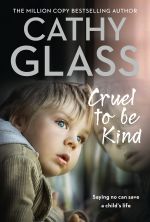Правообладателям!
Представленный фрагмент книги размещен по согласованию с распространителем легального контента ООО "ЛитРес" (не более 20% исходного текста). Если вы считаете, что размещение материала нарушает ваши или чьи-либо права, то сообщите нам об этом.Читателям!
Оплатили, но не знаете что делать дальше?
Текст бизнес-книги "Cruel to Be Kind: Saying no can save a child’s life"
Автор книги: Cathy Glass
Раздел: Жанр неизвестен
Текущая страница: 2 (всего у книги 2 страниц)
Chapter Three
Amazed
I saw Adrian do a double take as Max entered the living room, but to his credit he quickly recovered and said a welcoming, ‘Hi, I’m Adrian.’
Max nodded and lumbered over to the sofa where he heaved himself onto the seat and sat back. Jo sat beside him as Jill took one of the easy chairs. ‘What would you like to drink?’ I asked Max.
‘Cola,’ he said in a husky voice.
‘I’m afraid I haven’t got any of that,’ I said. Like many parents and carers, aware of how bad sweet fizzy drinks were for children’s teeth I limited them to special occasions. ‘You could have water, fruit juice, milk or squash,’ I offered.
‘Juice,’ he said.
‘Jo, what would you like?’ I asked.
‘A black coffee, please.’
Paula came with me to make the drinks and was clearly worried. As soon as we were out of earshot she said quietly to me, ‘What’s the matter with Max?’
‘He got a bit out of breath. He’ll be all right soon when he’s sat quietly and had a drink.’ But I knew that wasn’t the only reason for Paula’s question. It was impossible even for a young child (who are generally very accepting of differences) not to notice Max’s size.
‘Will he be able to play with us?’ she asked as I made Jo’s coffee.
‘Yes, of course, love.’
‘How will he ride the bike we got out for him?’
‘We’ll find some games he can play,’ I said positively. ‘Now, come on, stop worrying. We’ll take him his drink.’
I poured Max’s juice and carried it with Jo’s coffee into the living room where Jo and Jill were chatting lightly to Max, trying to put him at ease. Adrian was on the floor by the toy box, stroking Toscha. Paula went over and joined him. I gave Jo and Max their drinks and sat in another easy chair. Then a horrendous thought occurred to me. I looked at Jo. ‘Animal fur doesn’t affect Max’s breathing, does it?’ It is for reasons like this that any medical condition should be discussed with the foster carer at the time of the referral, not once the child has arrived. Children with allergies to animal fur generally have to be placed in foster families where there are no pets.
‘Not as far as I know,’ Jo said, taking a grateful sip of her coffee. ‘But I wasn’t aware he had asthma or was using an inhaler until today. I’ll ask his mother when I see her this evening.’ Then, looking at Max: ‘You have a cat at home, don’t you?’
‘Two,’ Max said. ‘Tiger and Smokey.’
‘Those are nice names,’ I said, relieved.
‘And they don’t make your breathing bad?’ Jill asked him.
‘No,’ Max said.
‘Best keep an eye on it, though,’ Jill said. Then to Jo: ‘Will he be having a medical?’
‘That’s something else I’ll need to discuss with his mother,’ she replied, setting her cup in its saucer. When a child first comes into care they usually have a medical. If the child is in care under a Section 20 then the parent’s permission is sought. ‘Caz told me he’d had some teeth out earlier this year,’ she added, ‘but I don’t know of any other medical conditions.’
Max had already finished his drink, having swallowed it straight down. ‘Would you like another drink?’ I asked him, as he was clearly thirsty. He nodded. ‘What would you like?’
‘Juice.’
I took his glass and went into the kitchen where I poured another glass of juice, aware that even pure juice has a high calorie content from the fructose sugar. Not a good idea for a child who is already badly overweight. Returning to the living room I passed the glass to Max and he drank down half of it in one go and then sat with the glass resting on his stomach.
‘Here’s the paperwork you need,’ Jo said, handing me the essential information and placement forms.
‘Thank you.’
‘Could you send a copy to the agency too,’ Jill said. ‘So we have it on file.’ This was normal practice.
‘Yes, of course,’ Jo said. ‘Sorry, I should have realized. It’s been a busy day.’ She took a notepad from her bag and made a note.
‘It’s a nice house, isn’t it?’ Jill said encouragingly to Max. He nodded.
‘I’ll show you around later,’ I said.
‘I’m hoping to send some of his belongings over tomorrow,’ Jo now said. ‘One of his sisters might be able to drop them off. She passes by the end of your road most days on her way to college.’
I looked at Jill. ‘I think we’ll need to discuss that,’ Jill said, nodding pointedly towards Max. For clearly discussing any issue in respect of Max’s family was going to be difficult in front of him. There was an awkward silence.
‘Now Max has recovered, perhaps he’d like to go in the garden with Adrian and Paula?’ I suggested. ‘There are some toys out there and a bench in the shade of the tree,’ I said to him.
‘That sounds nice,’ Jo said, appreciating my suggestion. ‘Let’s take a look, shall we?’ She set her cup and saucer on the coffee table and stood. Max, who’d been leaning right back into the sofa, began struggling to get off, shuffling forward but finding it difficult. Jo instinctively offered her hand and helped him off, as one would an elderly person. It was pathetically sad and another indication of just how being badly overweight was blighting his life. Most children would have leapt off the sofa and been down the garden in an instant.
I looked at Max as he waddled towards the patio doors. Of average height for a six-year-old, he had short brown hair, a pleasant face, round and open, and seemed quite placid in nature. I wondered how he coped with the inevitable name-calling in the school playground. My heart went out to him. Children can be cruel and anyone who deviates from the norm can easily become the object of bullying.
Just outside my patio doors there is one small step that leads onto the patio. It’s not high and is easily navigated by even small children, but Max now held onto the edge of the door to support himself as if worried he might lose his balance and topple. He carefully turned sideways and tentatively lowered one foot and then the other, as a toddler might. Outside, we all crossed the patio and went onto the lawn where the toys were.
‘What would you like to play?’ Adrian asked sensitively. ‘It’s a bit hot for football.’ Indeed, Max was perspiring again, although the sun was starting to lose its strength.
‘I’ll watch while you play,’ Max said quietly. ‘Like I do at school.’ I could have wept. The thought of the poor child having to sit and watch while his friends played instead of joining in touched me. Whether his non-participation was from not being able to run and keep up, discomfort if he tried or a fear of being laughed at I didn’t know – possibly a little of each – but it was desperately sad.
Adrian and Paula were looking a little awkward, not sure what to do for the best. ‘You can play,’ I said to them. ‘Max can join in if he wishes or sit on the bench. It’s up to him.’
‘I’ll sit,’ he said, and lumbered towards the bench in the shade. Toscha had followed us out of the house and strolled over to join him.
‘I’ll sit with you,’ Paula said to Max, suddenly losing her shyness. I think she felt sorry for him.
‘So will I,’ Adrian said. I saw Jill smile.
Max heaved himself onto the bench and Adrian sat on one side and Paula the other. Toscha sprawled at their feet.
‘I’ll leave the patio door open so you can come in when you want,’ I said for Max’s benefit. Jo, Jill and I then returned to the living room.
I was now expecting Jo to start talking about Max’s obesity, including details of the diet he must surely be following and any appointments at the health clinic. But, draining the last of her coffee, she opened her notepad and said to Jill, ‘What was the issue with Max’s sister bringing his clothes here?’
‘Cathy received a rather unpleasant telephone call from Max’s mother earlier this afternoon,’ Jill said evenly. ‘She wasn’t aware her contact details had been given to the family. We usually ask our carers first.’
Jo raised her eyebrows. ‘His mother wanted the phone number of where Max would be staying and I didn’t see a problem in giving it to her. He is in care voluntarily.’ It sounded as though it was me who had the problem.
‘It was quite a threatening call,’ I said. ‘Caz told me to give Max whatever he wanted or I’d have his father to answer to.’
Jo nodded dispassionately and made a note. ‘I’ll mention it to her when I see her later.’
‘Does the family have Cathy’s address too?’ Jill asked.
‘I’m not sure. I might have mentioned it but I think I just told her the area. She was quite insistent on a number of points before she agreed to Max going into care.’
‘Given the nature of the phone call this afternoon, if she doesn’t already have the address perhaps we could withhold it for now?’ Jill suggested diplomatically. ‘We can always review that later.’
‘All right,’ Jo said, and made another note.
I was grateful for Jill’s support. I felt that Jo, like many social workers, didn’t fully appreciate how worrying it could be for a carer to have an irate parent phoning or turning up on their doorstep. Social workers don’t have this worry, as the families they deal with don’t know their home address. While it’s often appropriate for the parents of a child in care to have the foster carer’s contact details, it didn’t hurt to err on the side of caution to keep everyone safe.
Jill took a pad and pen from her bag. ‘What are the contact arrangements?’ she now asked.
‘Caz wants to see Max every evening while she’s in hospital, as she has been doing. His sisters have been taking him, but I assume Cathy will be taking him now?’
‘Yes,’ I said.
‘Perhaps his sisters could take his bag to the hospital and Cathy could collect it from there?’ Jill suggested.
‘That would be good,’ I added.
‘I’ll mention it tonight,’ Jo said, making another note. ‘Hopefully they can arrange it for tomorrow. It’s too late this evening. They’ll be on their way to the hospital now – they use the bus.’
‘How long will Max see his mother for each evening?’ Jill asked.
I picked up my fostering folder and pen so I had them ready to write down the contact arrangements. I start a new folder for each child.
‘Caz said they have been visiting between five-thirty and seven, so I think keep to that.’
‘Is that all right with you?’ Jill asked me.
‘I’ll have to give the children their dinner before we go or it will be late by the time we get home,’ I said, thinking aloud.
‘OK,’ Jill said. ‘See how it goes. Max may be tired after an hour. It’s a long time for a child to be on a ward. Do you want Cathy to stay on the ward with Max? She’ll have Adrian and Paula with her, so it would be better if they could go and wait in the play area by the café.’ A good support social worker is invaluable in clarifying arrangements and making sure they are practical for the carer.
‘That should be all right,’ Jo said. ‘It’s not supervised contact. But please be on hand in case Max wants to leave early.’
I wrote the times of contact on a sheet of paper in my folder. ‘Will this start tomorrow?’ I asked, mindful of the time. ‘It’s already five-thirty now.’
Jo glanced at the clock on the mantelpiece. ‘Caz was expecting him this evening, but I take your point. I’m not going to be finished here for a while.’
‘Perhaps Max could phone and speak to his mother this evening?’ Jill suggested.
Jo nodded. ‘I’ll speak to Caz once I get there.’
‘Will Max be seeing his mother at the weekend too?’ I asked.
‘Yes,’ Jo said, as if it was taken as read. All very well, but that would mean any of our outings at the weekend, including visits to my parents, would need to be curtailed so we were back in time to take Max to the hospital. However, I knew this wasn’t negotiable, as contact arrangements take priority over the carer’s arrangements. Foster carers get used to fitting in.
‘Will you be applying for a Full Care Order?’ Jill now asked.
‘Not at this stage,’ Jo said. ‘As long as I have Caz’s cooperation, there shouldn’t be any need to. She’s cooperated in the past.’
‘What have been the concerns?’ Jill asked, meaning why were the social services already involved with Max’s family.
‘They’ve been mainly around the girls. They weren’t going to school and two of them have been in trouble with the police. Caz was finding it a struggle to cope. She has various health issues, including type 2 diabetes and a heart condition, so we put in some support.’
‘Is Max’s weight due to a medical condition?’ Jill asked.
‘No, I don’t think so,’ Jo said lightly. ‘His mother and sisters are all a bit chubby like Max. They like their food.’
I looked at her, amazed.
Внимание! Это ознакомительный фрагмент книги.
Если начало книги вам понравилось, то полную версию можно приобрести у нашего партнёра - распространителя легального контента ООО "ЛитРес".Правообладателям!
Представленный фрагмент книги размещен по согласованию с распространителем легального контента ООО "ЛитРес" (не более 20% исходного текста). Если вы считаете, что размещение материала нарушает ваши или чьи-либо права, то сообщите нам об этом.Читателям!
Оплатили, но не знаете что делать дальше?







